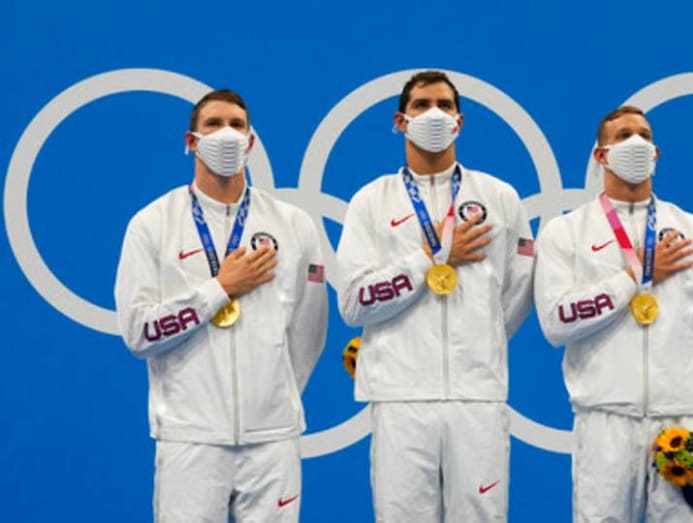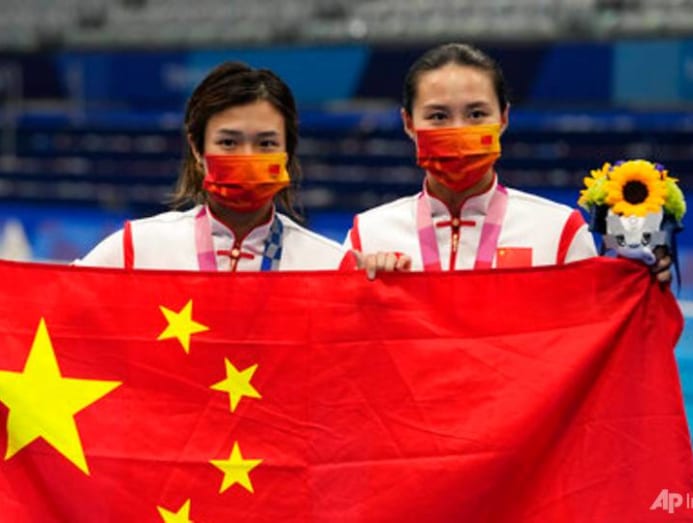Commentary: The Olympics medal tally skews towards bigger and richer countries
SINGAPORE: "The most important matter in the Olympic Games is non winning but taking part; the essential thing in life is not acquisition but fighting well."
Those words were once attributed to Baron Pierre de Coubertin, the founder of the modern Olympic Games.
And yet in sports, what matters greatly to nations are the medals around their athletes' necks. Very frequently, winning athletes in these Olympics nigh e'er likely come up from the big players – the United States, Great Britain, China, Russia and Federal republic of germany.
The top gold medal winners in Rio in 2022 were the US, Great United kingdom of great britain and northern ireland, People's republic of china, Russian federation and Federal republic of germany. The aforementioned nations were repeating the feat from four years earlier, only with South Korea pushing Germany into 6th.
These countries accept the economic power and sporting history to win gold in a multifariousness of events. A little lower down the standings are countries less able to manage competing across the entire sporting spectrum simply find success in specialising in a sport.
READ: Some 'very encouraging' Squad SG performances at Olympics; those who turn in disappointing performances need space: Edwin Tong
For instance, all of Republic of kenya'south 2022 six gold medals came in running events. Cuba'southward five came from boxing and wrestling while Uzbekistan excels in boxing and weightlifting. Smaller countries with smaller populations tin perform miracles to win a couple of golds, silvers and bronze but are way downward the rankings.
A MEDAL HAUL BUT AT WHAT COST?
In 1996, U.k. collected but one gold at the Atlanta Olympics. Stung from that perceived failure, it and so decided to invest cash from the national lottery to support athletes.
£345 meg (US$479 million) went into supporting athletes at the Tokyo Olympics and Paralympics – a staggering corporeality that many other countries struggle to match.

"The money enables the sports to put the correct construction, to find the right coaches and, crucially, information technology allows the athletes to be able to railroad train full time," Hugh Robertson, chair of the British Olympic Association, said in July. The Guardian called it a "brutal but constructive" method of pursuing Olympic glory.
There has been a steady improvement. In 2016, the country finished second in the rankings above Cathay with 27 golds.
READ: Olympics-Communist china pulls ahead on gold medals as American Kendricks out for COVID-19
It may be good for national pride, temporarily at least. And yet surveys carried out by Sport England in 2022 and 2022 showed that the general public had actually become less physically active.
Were high-performance sports prioritised over mass participation sports that raised the general level of action amidst the population and are seen as a public good? What else is sporting victory at the Olympics costing?
For the large boys similar the US, funding has been ploughed into sports that yield results. Swimming, gymnastics and athletics for example have consistently produced aureate medals for the sporting superpower.
Some others make up one's mind the race to the top and the money needed to make that happen was better spent elsewhere.
Olympic historian David Goldblatt writing in The Guardian gave the instance of Finland. "Ask the Finns, who abandoned the state-sponsored pursuit of medals and spent the money instead on active transport and attainable facilities.
"They barely win annihilation anymore, but they have the well-nigh active and healthy old people in the world. In Britain we accept a sack of gold and an obesity crisis," he wrote.
The focus on the medal table tin can lead to a indomitable, one-dimensional pursuit of success for its own sake, as if some sort of national pride was at stake. With the games now a multi-billion dollar manufacture with college stakes, it is naive to remember at that place is a style back to simpler times.
READ: Commentary: Hidilyn Diaz, national hero for pandemic-weary Philippines
We accept seen how the Games accept become fifty-fifty more commercialised, with a ballooning number of corporate sponsors and national awards for athletes who raise the signature of sports. Just look at how much sponsorships and endorsements have pumped up Michael Phelps' US$55 million net worth.
This is non to say the Games do not invest efforts to alive up to the high sporting ideals: The participation of a team of refugees in Tokyo for the second time in these Games, for instance, provided opportunities for less privileged athletes who may otherwise not have them. The Paralympics is a paragon of inclusivity in pursuing sporting excellence.
Merely it is hard to put the genie that makes a straight connection between the medals tabular array and national worth back in the bottle.
A Different METHOD
Perchance there could be a fairer way of calculating rankings such as predicting how many medals a country should win and so gauge performance from there.
At that place are "naive" models that predict the number of medals countries should get based on past performances at the Olympics.
The Financial Times has such a table, explaining that the conventional method reflects factors as "population size, economical might and past performance". This ways big, rich countries typically pb the pack, while nations that take home a modest number of medals merely punch well above their weight receive petty attention.

Researchers studying such factors instead rank countries by examining performance relative to expectations as the new basis for comparison. Countries that performed better than their expected full would end highest even if they may non have collected as many medals as some of those below them.
The FT model estimates the number of medals using a formula that takes into account a number of factors including GDP, population, past performances, whether a country has hosted or will be hosting subsequent Olympics (which historically has boosted their medal haul).
READ: Commentary: We demand to talk about why Joseph Schooling crashed in Tokyo
Who wins these medals should matter just equally much. "Countries in which women have more equal economic opportunities send more female person athletes to the Games, and more athletes mean more chances to win medals," said Julia Bredtmann, pb author of the original report.
This would surely reverberate countries' sporting standing in a more than desirable way than the current table, where information technology is near impossible to compete with larger powers like the US, with a population around 60 times bigger and more than than 1,000 times more than space for grooming and sporting facilities.
It could as well level the playing field somewhat and give smaller nations starting to develop a niche a run a risk to see where they really stand up.
It could also inspire others to compete seriously in a wider range of sports rather than but focusing on what they are adept at.
The good news too is that positions near the top of the tabular array will not necessarily entail the usual boxing between the US and China, an extension of the superpower rivalry, and other rich countries, but a competition betwixt a nation's past performance and its better self.
If such a complex model is complicated to use, looking at medal per population capita could give smaller countries more credit for their achievements.
This would at to the lowest degree be a step in the right direction and should lessen the fixation with the number of golds said to have driven the 2022 Sochi Winter Olympics Russian doping scandals.
John Duerden has lived in Asia for xx years and covers the region's sporting scene. He is the author of iii books including Lions & Tigers - The History of Football in Singapore and Malaysia (2017).
Catch the Olympics Games Tokyo 2022 Alive with 14 dedicated channels on meWATCH. Sign in now at mewatch.sg/tokyo2020 and get into the action with Mediacorp, Singapore's Olympics Network
Source: https://cnalifestyle.channelnewsasia.com/commentary/commentary-olympics-medal-tally-skews-towards-bigger-and-richer-countries-276986
0 Response to "Commentary: The Olympics medal tally skews towards bigger and richer countries"
Post a Comment